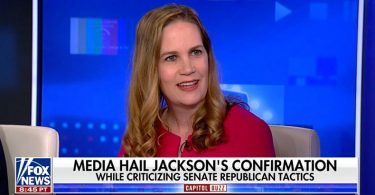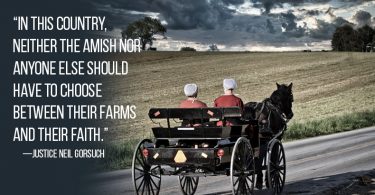I joined NPR’s Audie Cornish along with Matthew Yglesias of Vox to discuss the primary upset in New York, Justice Anthony Kennedy’s retirement and some of this week’s Supreme Court decisions. Listen in:
Transcript:
AUDIE CORNISH, HOST: We’ll start this hour with the week in politics, one that was full of game-changing shakeups, first the retirement of Supreme Court Justice Anthony Kennedy and Senate Leader Mitch McConnell’s call to confirm a new justice quickly.
(SOUNDBITE OF ARCHIVED RECORDING)
MITCH MCCONNELL: We will vote to confirm Justice Kennedy’s successor this fall.
CORNISH: And 28-year-old Alexandria Ocasio-Cortez toppling the fourth-ranking Democrat in the House of Representatives, New York’s Joe Crowley.
(SOUNDBITE OF ARCHIVED RECORDING)
ALEXANDRIA OCASIO-CORTEZ: I think because we were so clear about our values, we were always naming what we wanted to accomplish. And whether people said, oh, can you get that done in this Congress or not, they knew that they wanted a congresswoman or a congressmember that fought for those things.
CORNISH: And finally, the Supreme Court upheld President Trump’s travel ban in a 5-4 decision.
(SOUNDBITE OF ARCHIVED RECORDING)
PRESIDENT DONALD TRUMP: A tremendous success, and tremendous victory for the American people and for our Constitution. This is a great victory for our Constitution.
CORNISH: President Donald Trump speaking there. Here to talk more is Matthew Yglesias, columnist editor and co-founder of Vox. Hey there, Matthew.
MATTHEW YGLESIAS: Hello.
CORNISH: And Gayle Trotter, columnist, political analyst and attorney, you write for the Hill and The Daily Caller. Welcome to ALL THINGS CONSIDERED.
GAYLE TROTTER: Great to be here.
CORNISH: So we’re going to get to the court in a moment, but that race in New York which no one saw coming – should they have, Matthew?
YGLESIAS: Well, you know, I mean, I think the main reason people didn’t see it coming is that a number of other left challengers had come up short in earlier primaries. But when you look at it, you know, Joe Crowley was sort of a leader of the more moderate faction of congressional Democrats, but he was representing a very progressive district. It’s a majority minority district. It’s about half Latino. So it’s not – I mean, it was a shocking defeat.
And of course looking back in retrospect, though, you can see that some signs were there. It was a difficult district for a politician like him to hold down, and his opponent is extremely hardworking, intelligent very charismatic. You know, candidate quality matters a lot, and she had it as well as being a better fit ideologically and demographically for that district.
CORNISH: Gayle, I don’t know what you thought of this. I recall Crowley playing “Born To Run” on the guitar in his concession evening event, which was very bittersweet but somehow…
TROTTER: Right.
CORNISH: …Telling (laughter) about this race.
TROTTER: Yes, yes indeed. Well, it’s interesting because of all the talk of the split in the Republican Party. It shows that the Democratic Party has a split, too, between the more liberal traditional Democrats and the – what I would call the Venezuelan wing of the Democratic Party who support socialism, and they have, you know, the policy positions that are…
CORNISH: You’re calling them full-on Venezuela. I just want to pause for that (laughter).
TROTTER: Well, you know, that’s how we see it. And certainly that’s how the split in the Republican Party has been characterized – between a hard right and the moderate Republicans. And this is certainly a hard left position, this candidate. And I agree also on her enthusiasm. It reminds us a lot of the David Brat defeat of Eric Cantor in the Republican Party. And there is a need for fresh voices in the Democratic Party. And this I think shows definitely a dispute in the Democrat Party going forward.
CORNISH: I want to talk about the travel ban decision but specifically the 5-4 part of it – right? – ’cause this is why everyone cares about this Supreme Court retirement of the, quote, unquote, “decider justice,” Anthony Kennedy – reaction from you guys about his legacy.
YGLESIAS: You know, it’s interesting because some of the decisions that he will be best, sort of most widely remembered for – the decisions on marriage equality, the decision in Casey versus Planned Parenthood are decisions where he sided mostly with the other liberals on the court. But the decisions of this term where we had a lot of 5-4 decisions in which he joined with the conservatives are a reminder that, you know, he was put on the bench by a Republican. He timed his retirement strategically to have a Republican successor. And on most cases, you know, he was a conservative justice and sided with the conservative faction on the bench.
And that’s sort of the the reality of his legacy even though there were a couple of very important – and particularly the marriage equality decision he wrote – I think that’s going to stand the test of time clearly and will be probably the one thing that is most remembered about him even though it’s not fully reflective of the sort of whole body of his career.
CORNISH: Gayle, what do you make of this retirement happening now? There was a lot of reporting about the fact that the White House really gently encouraged him to retire.
TROTTER: Right, right. Well, there were definitely indications that he was looking to retire, and having a Republican president and knowing that his legacy would be secure with an appointment by a Republican president confirmed by the Senate would certainly incline him to choose this time rather than to wait longer. And then I would also say in relation to what Matt was saying, many of the decisions that he made upheld strong constitutional rights on free speech in Citizens United, in D.C. v. Heller, which is celebrating its 10-year anniversary on the right to choose self protection.
And he has a mixed legacy, but certainly conservatives appreciate that he was the five – the fifth vote on a lot of these very critical constitutional issues as well. And while his judicial philosophy might be a little perplexing to some, certainly he does want to see that his legacy is continued through ever – through whomever the nominee is from this administration.
CORNISH: To me, it was a reminder of the ways that this White House and this administration is pleasing key constituencies in the party – right? – that there are Republicans out there who like that they got their tax reform, and there are evangelicals out there who like the Supreme Court choices that they have before them. Am I misreading that?
TROTTER: Well, right. Think about this. There was a – exit polls that were done that 1 out of 5 people who voted in the 2016 presidential election cited Supreme Court appointments as the primary reason they voted. And of those voters who cited that, 58 percent of them voted for President Trump. So certainly he is keeping his promise. He had a great justice selection with Neil Gorsuch, and this is an opportunity to put another great justice on the Supreme Court.
CORNISH: Matt, Democrats are in raw panic. How do you read all this?
YGLESIAS: I mean, you know, this is a big deal. It’s a big shift. There’s not really anything that they can do I think to block the appointment of a much more conservative successor. They’re not happy about it. I think the rank-and-file want to see Democratic senators fighting. There’s obviously incredible ill will in the Senate over the way in which Merrick Garland was treated. But, you know, the reality is it’s politics.
This was an issue – Republicans had the majority in 2016. They used that majority to block a vote. Two Republican senators lost their re-election bids that year. If Moore had lost, Democrats would have a majority now, and they could do what they want. And it’s – it will be – this will be an important issue in November going forward. And, you know, it will be interesting to see how that plays. I think there’s a number of incumbents on both sides who are put in a more difficult position by raising the stakes this way.
CORNISH: We have just a few seconds left. So by topic, what is the area you think will be most changed by this court with another conservative justice, Gayle?
TROTTER: It’s not about any single issue. It’s not about any single case. President Trump and his administration hope that whomever they put into the Supreme Court will be there for 40 years. So you really can’t say it’s a single issue. It’s really just – if the – if there’s a single issue, it’s the philosophical commitment to the rule of law and honoring the Constitution.
CORNISH: Matt…
YGLESIAS: I think in more concrete terms, you know, abortion regulation and the future of affirmative action and treatment of race are two big questions where I think we’re going to see a swing to the right.
CORNISH: Matt Yglesias of Vox and columnist and analyst Gayle Trotter, thank you both for being here.
TROTTER: Great to be with you.
YGLESIAS: Thank you.








